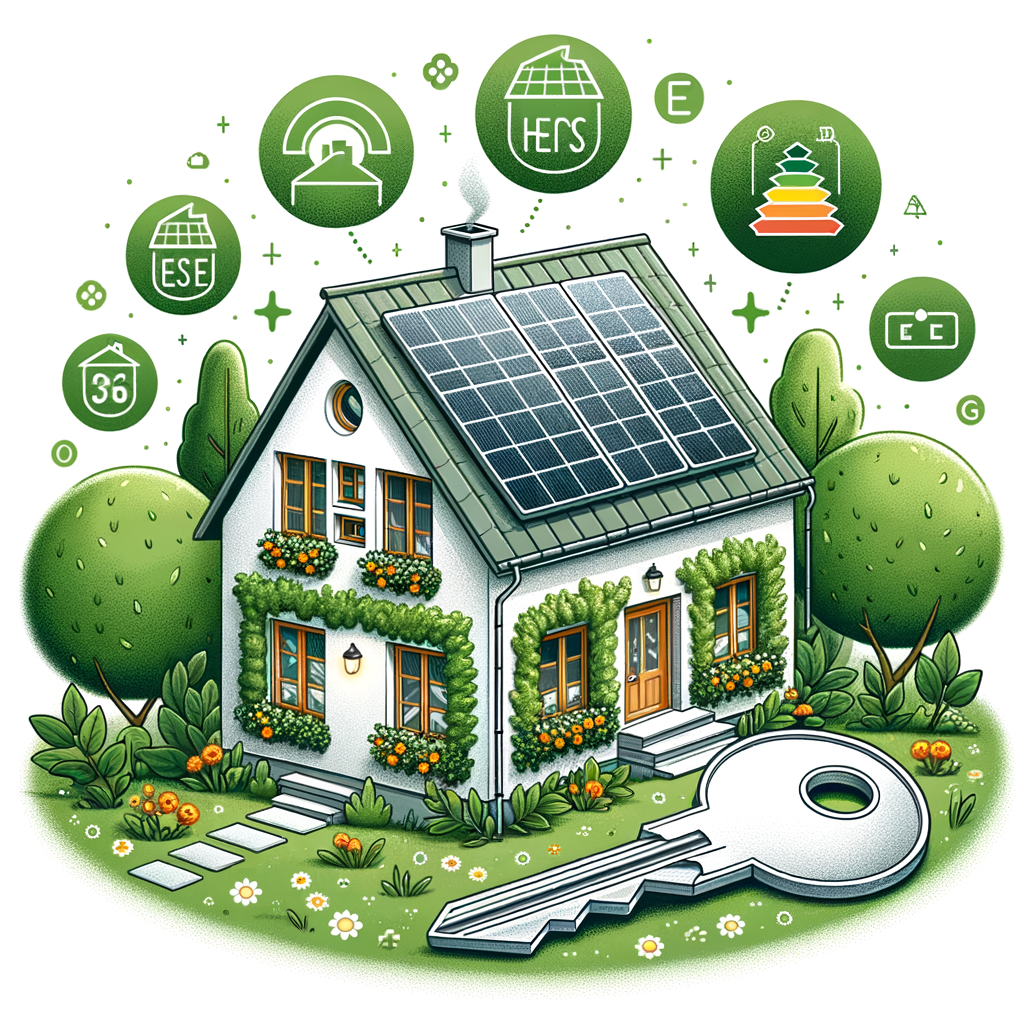Introduction
Introduction:
Home Energy Rating Systems (HERS) are a valuable tool for homeowners looking to make their homes more energy-efficient and environmentally friendly. By providing a standardized rating of a home’s energy performance, HERS can help homeowners identify areas for improvement and make informed decisions about upgrades and renovations. In this article, we will explore the benefits of HERS and how it can help create a greener, more efficient home.
How HERS Ratings Can Help You Save Energy and Money in Your Home
Home Energy Rating System (HERS) ratings are becoming increasingly popular among homeowners who are looking to make their homes more energy-efficient and environmentally friendly. HERS ratings provide a standardized way to measure the energy efficiency of a home, allowing homeowners to make informed decisions about how to improve their home’s energy performance. In this article, we will explore how HERS ratings can help you save energy and money in your home.
One of the key benefits of HERS ratings is that they provide a comprehensive assessment of a home’s energy performance. A certified HERS rater will evaluate various aspects of the home, including insulation, windows, heating and cooling systems, and air leakage. Based on this evaluation, the rater will assign a HERS score to the home, with lower scores indicating higher energy efficiency. By understanding your home’s HERS score, you can identify areas where improvements can be made to reduce energy consumption and lower utility bills.
HERS ratings can also help homeowners make informed decisions about home upgrades and renovations. For example, if your home has a high HERS score, you may want to consider investing in energy-efficient appliances, upgrading insulation, or sealing air leaks to improve your home’s energy performance. By prioritizing upgrades based on your HERS score, you can maximize the impact of your investments and achieve greater energy savings over time.
In addition to helping homeowners save energy and money, HERS ratings can also increase the resale value of a home. As more homebuyers prioritize energy efficiency and sustainability, homes with low HERS scores are becoming more desirable on the real estate market. By investing in energy-efficient upgrades and obtaining a low HERS score, you can attract potential buyers who are willing to pay a premium for a greener, more efficient home.
Furthermore, HERS ratings can help homeowners qualify for energy efficiency incentives and rebates. Many utility companies and government agencies offer financial incentives for homeowners who make energy-efficient improvements to their homes. By obtaining a HERS rating and implementing recommended upgrades, you may be eligible for rebates, tax credits, or other incentives that can offset the cost of your home improvements.
Overall, HERS ratings are a valuable tool for homeowners who are looking to save energy, reduce their carbon footprint, and lower their utility bills. By understanding your home’s HERS score and making informed decisions about energy-efficient upgrades, you can create a more comfortable, sustainable living environment for you and your family. Whether you are looking to make small changes or undertake a major home renovation, HERS ratings can guide you towards a greener, more efficient home that benefits both your wallet and the planet.
The Benefits of Investing in HERS Improvements for a Greener Home
Home Energy Rating System (HERS) is a valuable tool for homeowners looking to make their homes more energy-efficient and environmentally friendly. By investing in HERS improvements, homeowners can not only reduce their carbon footprint but also save money on energy bills in the long run. In this article, we will explore the benefits of investing in HERS improvements for a greener home.
One of the primary benefits of HERS improvements is the reduction of energy consumption. By making upgrades to your home’s insulation, windows, and HVAC system, you can significantly decrease the amount of energy needed to heat and cool your home. This not only helps the environment by reducing greenhouse gas emissions but also saves you money on your monthly energy bills. In fact, studies have shown that homes with lower HERS scores consume up to 30% less energy than homes with higher scores.
Another benefit of investing in HERS improvements is the increase in home comfort. By sealing air leaks, improving insulation, and upgrading windows, you can create a more comfortable living environment for you and your family. No more drafty rooms in the winter or sweltering hot spaces in the summer. With HERS improvements, you can enjoy consistent temperatures throughout your home year-round.
Furthermore, HERS improvements can also increase the value of your home. In today’s real estate market, energy efficiency is a highly sought-after feature among homebuyers. By investing in HERS improvements, you can make your home more attractive to potential buyers and potentially increase its resale value. In fact, studies have shown that homes with lower HERS scores sell for higher prices than comparable homes with higher scores.
Additionally, investing in HERS improvements can help you qualify for various incentives and rebates. Many utility companies offer rebates for energy-efficient upgrades, and some states even offer tax credits for HERS improvements. By taking advantage of these incentives, you can offset the upfront costs of making your home more energy-efficient and see a quicker return on your investment.
In conclusion, investing in HERS improvements is a smart choice for homeowners looking to make their homes greener, more efficient, and more comfortable. By reducing energy consumption, increasing home value, and qualifying for incentives, homeowners can enjoy a wide range of benefits from making their homes more energy-efficient. So if you’re looking to lower your carbon footprint, save money on energy bills, and increase the value of your home, consider investing in HERS improvements today. Your wallet and the environment will thank you.
Understanding the HERS Rating System and Its Impact on Sacramento Metropolitan Area Homes
The Home Energy Rating System (HERS) is a valuable tool for homeowners looking to make their homes more energy-efficient and environmentally friendly. In the Sacramento Metropolitan Area, where hot summers and cold winters can lead to high energy bills, understanding the HERS rating system can help homeowners save money and reduce their carbon footprint.
The HERS rating system is a nationally recognized standard for measuring the energy efficiency of a home. A certified HERS rater assesses various aspects of a home, including insulation, windows, heating and cooling systems, and air leakage. Based on this assessment, the home is assigned a HERS index score, with lower scores indicating higher energy efficiency.
One of the key benefits of the HERS rating system is that it provides homeowners with a roadmap for improving the energy efficiency of their homes. By identifying areas where energy is being wasted, homeowners can make targeted improvements that will not only reduce their energy bills but also make their homes more comfortable and environmentally friendly.
For homeowners in the Sacramento Metropolitan Area, where energy costs can be high, improving the energy efficiency of their homes can lead to significant savings. By investing in energy-efficient upgrades, such as installing high-efficiency windows, adding insulation, or upgrading to a more efficient heating and cooling system, homeowners can reduce their energy bills and increase the value of their homes.
In addition to saving money, improving the energy efficiency of a home can also have a positive impact on the environment. By reducing energy consumption, homeowners can lower their carbon footprint and help combat climate change. In a region like the Sacramento Metropolitan Area, where air quality is a concern, reducing energy consumption can also help improve air quality and public health.
One of the challenges that homeowners in the Sacramento Metropolitan Area may face when it comes to improving the energy efficiency of their homes is knowing where to start. This is where the HERS rating system can be particularly helpful. By working with a certified HERS rater, homeowners can get a comprehensive assessment of their home’s energy efficiency and receive recommendations for cost-effective upgrades that will have the biggest impact on their energy bills.
In conclusion, the HERS rating system is a valuable tool for homeowners in the Sacramento Metropolitan Area who are looking to make their homes more energy-efficient and environmentally friendly. By understanding the HERS rating system and working with a certified HERS rater, homeowners can identify opportunities to improve the energy efficiency of their homes, save money on their energy bills, and reduce their carbon footprint. Investing in energy-efficient upgrades not only benefits homeowners financially but also has a positive impact on the environment and public health. By taking steps to improve the energy efficiency of their homes, homeowners in the Sacramento Metropolitan Area can play a role in creating a greener, more sustainable future for their community.
Q&A
HERS stands for Home Energy Rating System.
HERS provides a standardized method for measuring a home’s energy efficiency, identifying areas for improvement.
By improving a home’s energy efficiency through HERS, homeowners can reduce their carbon footprint and save money on energy bills.
Conclusion
In conclusion, HERS (Home Energy Rating System) is a key tool for creating a greener and more efficient home by providing a standardized method for measuring a home’s energy performance. By using HERS to identify areas for improvement and implementing energy-saving measures, homeowners can reduce their energy consumption, lower their utility bills, and decrease their environmental impact.

